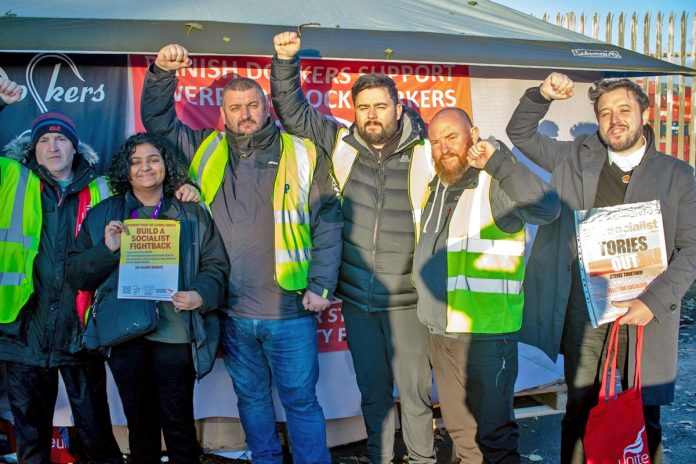Standing up to millionaire bosses
Unite shop stewards spoke to Phil Speakman, Liverpool Socialist Party
To understand the current situation in the dispute between the workforce and Mersey Docks and Harbour Container Services (MDHC), we need to look into the past.
On 19 September, 68 engineers and 600 dock workers withdrew their labour for a fortnight of strike action. This was in response to dissatisfaction among the workers over the implementation of the union-agreed 2021 pay awards.
The 2021 award was the first increase in pay rates since 1995! It was negotiated to be implemented on 1 April 2022 in two distinct stages.
Firstly, the roles within the company had been divided into twelve categories, of which only four subsequently received rises, of between 0.6% and 4%. The remaining eight categories received zero increase. Unite members have refused to accept this.
Secondly, a negotiated rise in 2021 of 4.5%, with an additional 0.5% increase from July 2022, was reneged upon by the employers. They stated ‘failure to meet targets’ as the reason for not complying. This was despite the port running at 120% capacity for over two years, even through the Covid-19 pandemic.
Furthermore, the grievances of the workforce have been exacerbated by the failure of the employer to restructure shift patterns, as previously agreed with Unite. Currently, the shift patterns are divided into two groups: permanent night shifts and rotation shifts.
The rotation shift pattern is currently two weeks of days followed by one week of nights. In order for the workers to enjoy a better work-life balance, a new structure of three weeks of days followed by one week of nights was negotiated in 2021. This has now been delayed unilaterally and without consultation, and won’t be implemented until 2024.
So what’s the real story on pay, instead of the fantasy wage figures often quoted in the mainstream media, where average pay of £43,000, and indeed up to £71,000, are often stated as fact?
The lowest-paid workers currently earn £25,000, with an average worker earning £31,000. This results in the lowest-paid worker taking home £371 per week after tax and National Insurance deductions. Hardly enough to fund a tabloid-concocted ‘champagne lifestyle’! A fully qualified HGV driver on the docks earns £12.37 an hour, compared to local supermarket wages often reaching £13 an hour.
So that gives us a historical perspective as to where we are now.
On Tuesday 11 October, MDHC escalated their attack on workers’ rights by issuing ‘HR1’ forms to all employees in the container section – putting 132 workers on 90-day redundancy notices. 109 are dockers, but technical and clerical staff, and two apprentices, are also affected. The Unite union does not accept the need for any redundancies, voluntary or compulsorily.
In response to this provocation, the HGV drivers and terminal two control room staff, responsible for controlling the loading vessels, have joined their fellow workers on strike since the Tuesday announcement.
This has operational implications far beyond Liverpool Seaforth, affecting other Peel Holding-owned ports at Heysham, Great Yarmouth, London Medway, Clyde Port in Glasgow, and Dublin.
The international reach of the dockers’ arms have grown long since the 1995-98 strike, with the formation of the International Dockers Council (IDC). This is despite the dock workers being betrayed by the Transport and General Workers’ Union (one of Unite’s predecessor unions) under the leadership of, now Lord, Bill Morris, and the failure of the then Labour government to use its part-ownership of MDHC to force a negotiated settlement.
IDC representatives from South Carolina have been supporting the Liverpool dockers, with Ken Riley from the International Longshoreman Association speaking in Liverpool during the Labour conference week at ‘The World Transformed’ events. Solidarity has also come in practical assistance from workers in Sweden, Denmark, France, Spain, Belgium and Chile.
This is in addition to support received from workers closer to home, in Tilbury and Southampton. On Thursday 13 October, we dispatched a delegation of dock workers to Hull to demonstrate against the rerouting of ships to Hull and Felixstowe.
Unite the Union has affiliation to both the International Transport Federation and the IDC, and is looking to increase its operations with the support of both organisations. Likewise, Unite is reaching out to Australian trade unions, in order to exert pressure on the second-largest shareholder of Peel Ports, Australian Super – an Australian pension fund holder.
- The Liverpool dockers spoke to the Socialist during their strike from 11 to 17 October. Another two weeks of action have been announced over pay and jobs from 24 October







